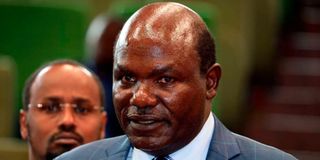Fear the greatest hurdle for IEBC

IEBC Chairman Wafula Chebukati. The electoral agency has invited the four presidential candidates to a meeting next Wednesday on the back of mounting protests over its controversial ban on the use of the printed voter register on polling day.
If Deputy President William Ruto today proclaimed that the sun rises in the south, former Prime Minister Raila Odinga will counter that it rises from the north.
That is the nature of Kenyan politics, where the main presidential candidates—this time being DP-cum-opposition leader Ruto versus Opposition leader-turned Establishment favourite—are driven by nothing more honourable than the Dr Nyet approach.
But there should at least be one thing that their respective political formations will agree on: The imperative for a clean election.
Tomorrow, Dr Ruto’s Kenya Kwanza Alliance and Mr Odinga’s Azimio la Umoja One Kenya Coalition Party will be joined by the other two presidential candidates—Prof George Wajackoya of Roots Party of Kenya and Mwaure Waihiga of Agano Party—on a date with the Independent Electoral and Boundaries Commission (IEBC).
We will find them all largely united on the questions and issues they will have for electoral boss Wafula Chebukati. They will want assurances on integrity of the voters register; security and reliability of the electronic voter identification and results transmission systems; the source and security of ballot papers and other election materials; and, of course, overall issues around guarantee of free and fair elections.
If Mr Chebukati can assure the candidates that he will deliver an unimpeachable election, all of them will go home satisfied.
But this is Kenya. Even as Dr Ruto and Mr Odinga each exude confidence of early and resounding victory, both are also considering the possibility of defeat, and preparing the narratives that they will be employed to justify contestation of the results.
Therefore, it is likely that when they meet the electoral commission, it will be from both camps not just be about seeking assurances that the election will be flawless.
Nothing Mr Chebukati says will leave them satisfied, because they are both preparing for the ‘I wuz robbed’ moment. Theirs will not be about helping IEBC seal all loopholes and eliminate weaknesses in the election infrastructure but about poking holes in the system. They will go public with narratives that will be spun till Election Day.
Mr Chebukati’s only answer should be to ultimately prove the sceptics and conspiracy theorists wrong by delivering an election so clean that anybody who challenges it will be universally condemned as a sore loser and troublemaker.
Assuage fears
Mr Chebukati, of course, still has a lot to do. Beyond the ritual grouses from politicians, he also has to assuage the fears of all other interested parties, including some 22 million voters that he is not up to the task.
Frankly, he came out of the last general election smelling rather bad after the presidential election result he pronounced was nullified by the Supreme Court.
It is testimony to the man’s resilience that he survived to oversee another election but the baggage from 2017 remains a millstone around his neck.
Mr Chebukati will be judged not by his words but by his deeds. That is a burden he will bear all the way to polling day and many days after.
One of the things he must contend with is the deficit of trust. It is not just the political class but everyone else who holds the electoral management body in deep suspicion, and extends that to all the other state organs having a role in the elections.
Ghanaian experience
Just last week, the Kenya Media Stakeholders Working Group hosted IEBC and other interested parties to a discussion on elections and media. Present were an official of the Ghana Electoral Commission, as well as a journalist from the West African country.
Many of those at the conference listened, mouths agape, to stories about the Ghanaian experience in running elections, touted as case studies for the rest of Africa.
The difference between Kenya and Ghana is trust. In Ghana, the candidates, political parties and citizens trust the electoral body to deliver. They all trust the government in the facilitative role of providing security and helping to transport election materials countrywide.
And all trust the media to faithfully and accurately report the election results as they come in from the polling stations, broadcast their own tallies and project and call the results even before the electoral commission does. The word is Trust.
Here at the conclave of presidential candidates and IEBC, a lot of time will be spent on how campaign agents will be flown to Greece at taxpayer expense to camp there monitoring the printing of ballot papers.
Our Ghanaian guests were quite bemused to learn that our ballot papers are printed abroad. They assumed we don’t have the technical capacity. Should we tell them?
[email protected]. www.gaitho.co.ke @MachariaGaitho





